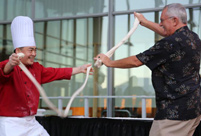 Geng Xuan crowned at 9th China Super Model Contest
Geng Xuan crowned at 9th China Super Model Contest
 Top 10 billionaires in the liquor industry
Top 10 billionaires in the liquor industry
 Backstage at China Fashion Week
Backstage at China Fashion Week
 Ballerinas anywhere but onstage
Ballerinas anywhere but onstage
 Top 10 safest airlines in the world
Top 10 safest airlines in the world
 Top 10 most popular instant messaging apps in the world
Top 10 most popular instant messaging apps in the world
 Inspiring shadow images of Chinese army
Inspiring shadow images of Chinese army
 Models shine Xinjiang auto show
Models shine Xinjiang auto show
 From laid-off worker to int'l referee in bodybuilding
From laid-off worker to int'l referee in bodybuilding
 Selected photos of 'two sessions'
Selected photos of 'two sessions'
The Arab Spring, a series of movements that ignited the Middle East at the onset of this decade, quickly became synonymous with the term "revolution."
The West was also quick to pounce on this bandwagon, latching on to the opportunity to promote itself as a supporter of democracy.
But alas, a couple of years on, most of those experts, writers and analysts have started backpedaling on their own arguments presented just a few years ago.
Revolution, in its literal sense, means: a forcible overthrow of a government or social order, in favor of a "new system." Although the Arab Spring indeed saw a forcible overthrow of various regimes, was the aim of a "new system" achieved? Was a more equitable social order established?
Tunisia was the first casualty of the Arab Spring. A fruit vendor named Mohamed Bouazizi on December 17, 2010 immolated himself to death to protest against injustice. His self-immolation catalyzed movements that spread throughout the country, and forced then Tunisian president Zine El Abidine Ben Ali to step down. But did Tunisia achieve change?
The Al-Nahda Movement assumed power through a smooth transition without disturbing the secular constitution, but has widely been criticized for promoting Wahhabism in the country. Its followers have frequently attacked bars and shops for selling alcohol.
Egypt followed suit. Tahrir Square roared with chants of change calling for then president Hosni Mubarak to quit. Mubarak, with the military on his side, initially resisted, but had to succumb to public demands and paved way for the famous elections that saw the Islamic-inclined Muslim Brotherhood rise to power.
The all-powerful Egyptian army allowed democracy to flourish for a short interval, watching events unfold with president Mohamed Morsi making unpopular legislation and decisions.
Such was the public image created for the Brotherhood and Morsi that the same Tahrir crowd, which once cheered for democracy, gathered again calling for the army to intervene and overthrow a democratically elected government. Again, was it a revolution?
Libya to a larger extent was a casualty of collateral damage in the Arab Spring. The "pro-democracy" rebels, magnified by the media and supported by Western forces and Al Qaeda-affiliated militias were successful in quickly disposing of the four-decade long ruling Muammar Gaddafi, along with liberating Tripoli.
Libya is now considered a stronghold of various Islamist militias willing to kill scores to gain authority and influence. The same militias didn't even spare a US diplomat, forgetting the fact that the US was one of the main backers of the rebel movement.

 Wonderful moment of China's airborne forces
Wonderful moment of China's airborne forces Bai Baihe shoots for fashion magazine
Bai Baihe shoots for fashion magazine Red terraced fields in Dongchuan of Yunnan
Red terraced fields in Dongchuan of Yunnan Jiaju Tibetan Village
Jiaju Tibetan Village Spring dating
Spring dating Confucius institute at UC Davis
Confucius institute at UC Davis Little painted faces at temple fair
Little painted faces at temple fair Top 10 safest airlines in the world
Top 10 safest airlines in the world Foreign students at China-Myanmar border
Foreign students at China-Myanmar border Ballerinas anywhere but onstage
Ballerinas anywhere but onstage Most unusual taxis around the world
Most unusual taxis around the world Micro-expression at 'two sessions'
Micro-expression at 'two sessions' Bridge Worship Festival in Taijiang, SW China
Bridge Worship Festival in Taijiang, SW China Hollywood documentary brings Diaoyu Islands truth to new audience
Hollywood documentary brings Diaoyu Islands truth to new audience Miss HK and actresses shine at flower show
Miss HK and actresses shine at flower showDay|Week|Month